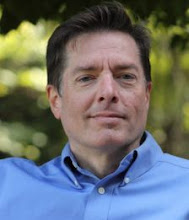Preface: The purpose of this post is to put forth a theory of mine about why there is such intense vilification of homosexuals by Christian fundamentalists. I hope that by putting these ideas "out there" that there might be some increased level of understanding between the two groups of people. In putting this post together, I have thought a lot about this issue, and there is a lot more that could be said on the topic, so this is not the "only" explanation, but only one possible aspect of why religious fundamentalists work to persecute homosexuals.
This post uses the word "sin" quite a bit when referring to homosexuality. Please note: I do not believe that being homosexual or that homosexual behavior is intrinsically sinful, however many fundamentalists do believe that, and I am trying to understand and illustrate their thought processes.
"But you were washed, you were sanctified, you were justified in the name of the Lord Jesus Christ and in the Spirit of our God." (1Cor.6:11). This is one of several quotes from the Bible that talks about how faith in Jesus Christ causes one to be "sanctified". Many Christian fundamentalists, especially the "born again" variety, credit their religious faith with turning their lives away from sin. Although most people accept that humanity is "fallen" and therefore is not able to live life free from sin, there are some that take the above quoted passage (and other similar biblical passages) to mean that the faith they have in Jesus Christ protects them from the propensity towards sin. However, the faithful are still human, and they are not perfect, and so some aspect of their lives, their character, their personalities will contain some propensity towards "sin". I believe that many fundamentalists unconsciously repress recognition of their own sinfulness, in order to rectify their faith in the promised sanctification that their religion professes. I also believe that this repression causes them to magnify their judgment of the sins of others. I believe it's especially easy for them to be more judgmental of the sins of others that they do not have personal experience with.
Because being "born again", or otherwise a Christian with fundamentalist beliefs necessitates that you conform to certain standards and practices of behavior (e.g. professing your faith, preaching the gospel, attending worship services, etc.) people who are successful at maintaining fundamentalist beliefs are generally heterosexual (or else VERY repressed bisexual or homosexual people - for the purposes of this discusssion, lets limit ourselves to the heterosexual fundamentalists). When most heterosexuals imagine (or try to imagine) having sexual relations with someone of the same sex, they find that thought abhorrent (just as most homosexuals react when imagining having opposite sex relations). That, coupled with the fact that no one in their like minded fundamentalist peer groups is homosexual, makes it easy for that perceived "sin" to be hated.
Although extramarital heterosexual relations, and divorce are also "sins", they are all too common even within religious circles - so one would risk offending members of their peer groups if one were to persecute those perceived to have committed those sins, however, since homosexuals are "other", and "separate", and almost uniformly non-believers (at least with respect to fundamentalism), it is safe to be openly judgmental about the sin of homosexuality.
The biblical promise of salvation and sanctification contributes to the Christian fundamentalist attitude of being "set apart" from the rest of "worldly" humanity. This often leads to a certain amount of pride and arrogance on the part of the fundamentalist, especially those who are active in fundamentalist circles. That pride, that "holier than thou" attitude, coupled with the certainty that their bible calls homosexuality an "abomination" 1 allows the fundamentalist a free pass to persecute people who engage in homosexual behavior.
Religious fundamentalists are still fallen human beings who are sinners, in spite of the sanctification that living their faith provides. Denial and repression of their own failings causes internal conflicts that need to be expressed. One way to deal with that internal conflict is to magnify the judgment of the sins of others for which they and almost all other people in their fundamentalist circles are innocent. It will be very difficult to "bridge this gap" since there is very little overlap between groups of fundamentalists and groups of open and proud GLBT people.
1 I am not going to address my belief that the fundamentalist's bible is wrongly using the word "homosexuality" when calling it and other behaviors "abominations". The important thing in the context of this post is that fundamentalists believe that their bible says what they think it says.
Subscribe to:
Post Comments (Atom)

No comments:
Post a Comment
I am interested in any and all feedback! However, I reserve the right to block or delete comments that I believe constitute "spam". That does not mean I won't respect disagreement.